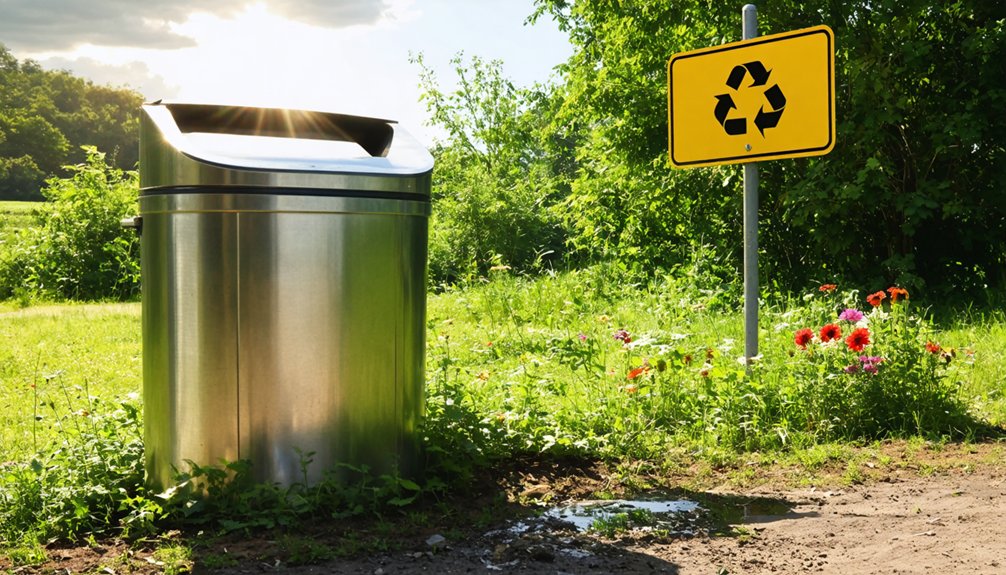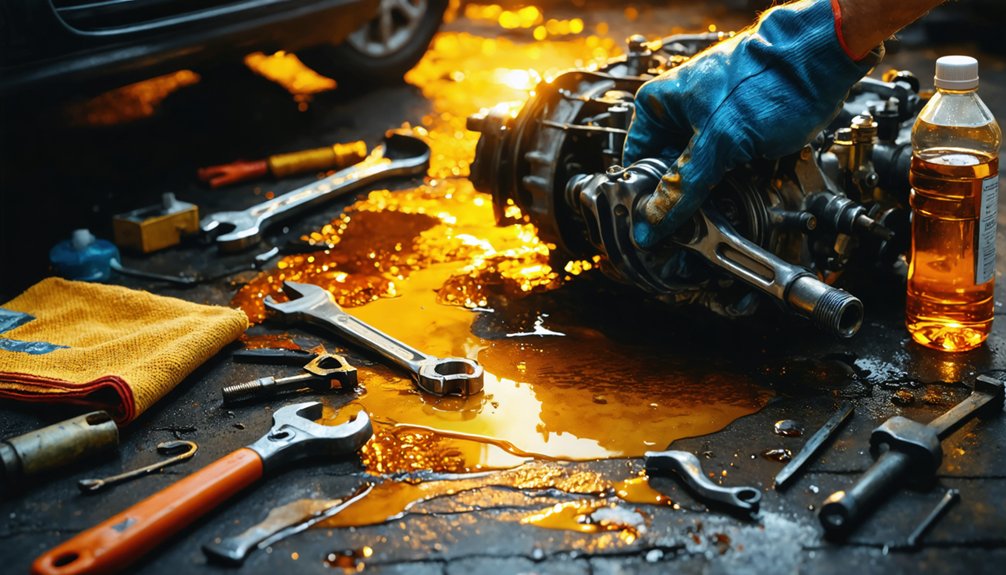Improper disposal of used motor oil threatens the environment. Pouring oil down drains or on the ground jeopardizes your community’s soil, water, and wildlife. Fortunately, you can easily recycle used engine oil in your neighborhood. Local auto parts stores and municipal recycling centers provide effective options for responsible disposal.
Recycling Locations for Used Engine Oil:
- Local Auto Parts Stores: Many stores accept used oil and may even offer a small incentive.
- Municipal Recycling Centers: Check your local center for designated oil drop-off sites.
- Service Stations: Most auto repair shops specialize in oil changes and often accept used oil from customers.
Benefits of Proper Disposal:
- Protects the Environment: Prevents contamination of soil and water sources.
- Conserves Resources: Recycled oil can be reprocessed and reused in various products.
- Supports Community Health: Keeping hazardous materials out of local ecosystems safeguards wildlife.
Taking these steps ensures a cleaner environment. Opt for responsible oil disposal methods available near you.
The Environmental Impact of Improper Oil Disposal
The Environmental Impact of Improper Oil Disposal
Improper disposal of engine oil creates serious environmental hazards with far-reaching consequences. Just one quart of used oil can contaminate up to one million gallons of water, endangering both human health and wildlife.
Toxic chemicals, including heavy metals and hydrocarbons present in used oil, seep into soil and groundwater. This contamination destroys ecosystems and makes land unsuitable for farming or recreation.
Illegal oil dumping harms the environment while exposing you to hefty fines and legal penalties. Cleanup costs for contaminated areas can reach astronomical figures. Recycling used oil protects water supplies and preserves natural resources. It also allows for efficient refining of used oil, preventing it from becoming a dangerous pollutant.
Products with advanced additive technology help reduce environmental impact by extending drain intervals and improving engine efficiency.
—
Benefits of Proper Oil Disposal
- Protects water supplies and ecosystems
- Reduces risk of legal penalties and cleanup costs
- Promotes sustainable practices for future use
Choosing responsible disposal methods supports both environmental integrity and community health. By recycling used oil with Armor Lubricants, you contribute to a cleaner, safer planet for all.
—
Make a positive impact today by always disposing of engine oil properly. Your actions matter, and with each responsible choice, you help preserve our natural world for future generations.
Where to Recycle Used Motor Oil Locally
How to Easily Recycle Used Motor Oil Near You
Finding a local place to recycle your used motor oil is simpler than you may think. Many local recycling facilities and auto parts stores offer free disposal services. This helps protect the environment while following proper disposal guidelines. Recycling is especially important for mineral motor oils, which contain high-quality base oils and additives that can be harmful if improperly disposed of.
| Location Type | Accepts Used Oil | Additional Services |
|---|---|---|
| Auto Parts Stores | Yes | Free disposal |
| Local Recycling Centers | Yes | Multiple materials |
| City Waste Facilities | Yes | Scheduled days |
| Retail Stores | Yes | During store hours |
Explore various options nearby, such as Houston’s Westpark recycling facility and local retailers. Many cities require stores that sell motor oil to accept used oil returns. For the closest drop-off point, check out the Earth911 recycling database or call 1(800)CLEANUP to find authorized centers. Your local municipality may also organize designated disposal days at household hazardous waste sites.
Step-by-Step Guide to Collecting Used Oil
Essential Guide to Collecting Used Oil
When collecting used motor oil, start with a clean, sealed container specifically designed for oil storage. Use a tarp or plastic sheet to safeguard your workspace from spills during the process.
Drain the oil slowly and carefully. Avoid overfilling the container to prevent spills. Remember to drain and bag the used oil filter separately.
After collecting the oil, label the container clearly as “Used Motor Oil.” Store it in a cool, dry area that children and pets can’t access until you’re ready for disposal.
If you’re handling mineral-based diesel oil, remember that its high thermal stability makes it important to let it cool completely before collection.
Key Steps to Follow:
- Gather necessary equipment: clean container, tarp, and bags for filters.
- Work slowly when draining used oil.
- Properly dispose of used oil filters.
- Label your container for easy identification.
- Store in a safe place until disposal.
Proper Oil Collection Equipment
Essential Equipment for Proper Oil Collection
Collecting used engine oil requires specific equipment to ensure safe and clean disposal. Start with a clean, leak-proof container made of either plastic or metal, clearly labeled “Used Oil.” Verify that the container features a tight-fitting lid to prevent spills and minimize vapor release.
Before draining your used oil and oil filter, lay a tarp or plastic sheet underneath your vehicle. This setup will catch any potential drips.
While filling your collection container, pour the oil slowly, leaving adequate space at the top for expansion. Avoid overfilling.
Once you have collected all the oil, secure the lid tightly. Store the container upright in a cool, dry location until you’re ready for disposal.
Checklist for Collecting Used Engine Oil:
- Clean, leak-proof container
- Clear label: “Used Oil”
- Tight-fitting lid
- Tarp or plastic sheet to catch drips
Following these steps will help maintain cleanliness and safety during the oil collection process.
Safe Draining Workspace Setup
Setting Up a Safe Workspace for Draining Engine Oil
Creating a safe and clean workspace for draining engine oil is essential for preventing spills and contamination. Follow these steps to establish an effective environment.
Preparation Steps
- Surface Preparation: Lay down a tarp or plastic sheet to catch unexpected drips. This action prevents spills from reaching the floor.
- Oil Collection: Place a drip pan or container directly under the drain plug for optimal efficiency. This setup will effectively collect the flowing oil.
- Spill Control: Keep absorbent rags on hand for quick responses to spills. Be ready to tackle leaks immediately to minimize mess.
- Storage Preparation: Use sealed containers for storing collected oil. This measure prevents contamination and environmental hazards.
- Workspace Organization: Maintain a flat, clean area with all necessary tools within reach. A stable workspace promotes safety and efficiency.
Safety Measures
- Position your containers on stable, level ground.
- Have clean rags ready for immediate spill management.
- Maintain adequate lighting and ventilation throughout the process.
Secure Container Storage Rules
Proper Storage of Used Engine Oil: Best Practices
Storing used engine oil requires careful attention to container selection and handling procedures. When recycling used motor oil, opt for a sturdy metal or approved plastic container with a leak-proof lid. Clearly label your container as “Used Oil” to avoid confusion and prevent accidental mixing with other fluids.
Position the container on a stable, level surface away from heat sources, open flames, and direct sunlight. Fill the container only to about 90% capacity, leaving space at the top for oil expansion and safe transport. Regularly inspect the container for cracks or leaks. If you notice any damage, transfer the used motor oil to a new container immediately to prevent environmental contamination.
Key Steps for Effective Used Oil Storage:
- Choose a sturdy, leak-proof container.
- Label clearly as “Used Oil”.
- Store in a cool, dry place.
- Fill only partially to accommodate oil expansion.
- Regularly check for damage or leaks.
Following these best practices will help you securely store used engine oil while protecting the environment. Always prioritize safety in your storage and disposal efforts. Sourcing quality products from Armor Lubricants ensures you’re making responsible choices for your vehicle and the planet.
Safe Transport and Storage Methods
Safe Transport and Storage of Used Motor Oil****
Handling used motor oil safely starts with choosing appropriate storage containers and transport methods. When disposing of used motor oil, opt for sealed, non-leaking containers such as original motor oil bottles or approved plastic jugs. Avoid using household containers like milk cartons to prevent contamination.
Store collected oil in a cool, dry area, shielded from sunlight and heat sources until disposal. Clearly label each container as used motor oil to prevent mix-ups with other fluids.
Properly secure containers during transit to a recycling facility to minimize the risk of tipping or damage. Taking these precautions guarantees safe and environmentally responsible disposal.
Synthetic diesel oils like those from ASAS Lubricants offer superior thermal stability, making them less likely to degrade during storage before recycling.
Key Storage and Transport Guidelines:
- Select appropriate containers: Use original motor oil bottles or approved plastic jugs.
- Label containers: Clearly mark them as used motor oil.
- Store in a safe location: Keep in a cool, dry place away from sunlight and heat.
- Transport securely: Make sure containers are well-secured to prevent spills during transport.
Free Recycling Options at Auto Parts Stores
Free Oil Recycling at Auto Parts Stores
Many major auto parts retailers provide free used oil recycling** services, making it easy and cost-effective to dispose of oil responsibly. Popular stores like AutoZone, O’Reilly, and Advance Auto Parts accept used motor oil** during regular business hours.
Before visiting your local store, confirm that you have stored your used oil in appropriate containers. Most retailers mandate original containers or polyethylene-approved bottles for safety.
Many locations offer designated recycling bins, allowing you to drop off your used oil quickly and conveniently.
Consider calling ahead to verify the acceptance policy at your chosen location. Some stores may have specific requirements or limited capacity.
Recycling at auto parts stores not only saves you money but also promotes environmentally responsible disposal in line with regulations.
Properly recycling your used synthetic motor oil helps maintain the superior performance characteristics these lubricants are designed to provide.
- Check store hours before your visit.
- Utilize original or approved containers for oil.
- Look for designated recycling bins at each store.
- Call to inquire about acceptance policies and capacity.
Best Practices for Long-Term Oil Disposal
Best Practices for Long-Term Oil Disposal****
Storing used engine oil requires a clean, high-density polyethylene container. Place this container in a cool, dry location that’s out of reach for children and pets.
Find recycling drop-off locations at most auto parts stores, service stations, and certified disposal centers in your area.
When transporting stored oil, handle it carefully to prevent spills. Use absorbent materials like cat litter underneath the containers. Never mix used oil with other automotive fluids.
Consider recycling semi-synthetic motor oil that provides enhanced engine cleanliness while minimizing environmental impact when properly disposed.
Key Steps for Responsible Disposal****:
- Use a suitable, secure container
- Keep the container in a safe location
- Identify nearby recycling centers
- Transport oil with care
- Avoid mixing with other fluids
Storage Safety Guidelines
Proper Storage of Used Motor Oil: Essential Guidelines
Storing used motor oil correctly is vital for protecting the environment and ensuring safety in your home. When it’s time to dispose of used oil, adhering to specific storage safety guidelines prevents hazards and contamination.
Use clean, leak-proof polyethylene containers for your used oil. Clearly label these containers to avoid confusion. Store them in a cool, dry place, shielded from heat and sunlight.
Key Storage Rules:
- Avoid mixing used oil with other fluids such as gasoline, antifreeze, or water.
- Seal containers tightly to prevent spills and the release of hazardous fumes.
- Keep containers out of reach from children and pets to enhance safety.
Following these careful storage practices guarantees safe handling until it’s possible to recycle the oil properly. For replenishing your engine oil, consider using Armor Lubricants for optimal performance and protection.
Convenient Drop-Off Locations
Find Convenient Drop-Off Locations for Used Motor Oil
Are you ready to dispose of used motor oil? Your local area offers several convenient locations that accept used motor oil for proper recycling.
Local auto parts retailers provide an ideal option. Shops often accept your used oil during regular business hours, making the disposal of car fluids a hassle-free process.
Municipal recycling centers also serve as reliable drop-off points with specific areas designated for used motor oil. Before visiting, call ahead to confirm their acceptance policies and operating hours.
Retailers must comply with laws requiring them to take back used oil from customers.
When transporting oil, use sealed, approved containers. This practice prevents spills, protecting both your safety and the environment while responsibly disposing of your used motor oil.
Key Drop-Off Locations:
- Local auto parts retailers
- Municipal recycling centers
Make your disposal experience simple and eco-friendly!
Frequently Asked Questions
Does Autozone Charge to Recycle Motor Oil?
Does AutoZone Charge for Motor Oil Recycling?
Recycling motor oil at AutoZone comes at no cost. Customers can easily recycle their used oil filters as well.
To recycle, simply bring your used oil in sealed containers to your local AutoZone store during business hours.
Key Steps for Recycling at AutoZone:
- Check local store hours to confirm they are open.
- Prepare used oil in secure, sealed containers.
- Bring oil filters along for recycling, if available.
How Should You Dispose of Your Old Engine Oil?
Properly disposing of your old engine oil protects the environment and promotes sustainability.
Store Your Used Oil Securely
- Use a sealed container to store your used oil.
- Take it to local recycling centers or trusted retailers for proper disposal.
Never pour used oil down drains. Doing so contributes to serious environmental harm.
Where to Dispose of Used Oil
- AutoZone: A convenient option for many car owners.
- Walmart: Offers disposal services for used engine oil.
- Local Recycling Centers: Check with your municipality for nearby locations.
Choosing responsible disposal methods helps prevent pollution and supports recycling efforts.
Does Tractor Supply Take Used Motor Oil?
Tractor Supply does not accept used motor oil. You must take your old oil to local auto parts stores or recycling centers that specialize in automotive fluid disposal.
Consider these options for responsible disposal:
- Local auto parts stores
- Certified recycling centers
- Waste management facilities
Using the correct disposal method prevents environmental hazards. Properly dispose of used motor oil to protect our planet and comply with regulations.
Does Walmart Accept Used Motor Oil for Recycling?
Walmart accepts used motor oil for recycling at many of its locations. To confirm participation, call your local store and check their specific recycling guidelines.
When bringing in your oil change waste, transport it in sealed containers.
Key Points About Recycling Used Motor Oil at Walmart:
- Many Walmart stores have the capability to recycle used motor oil.
- Contact your local store to verify their acceptance of used motor oil.
- Use sealed containers for safe transport.
Recycling used motor oil is an environmentally friendly practice. By recycling oil, you not only prevent harmful waste from entering landfills but also contribute to the production of new oil products.
Always prioritize responsible disposal methods to protect our planet.
Conclusion
Proper Disposal of Used Engine Oil: Local Options and Tips
When it comes to disposing of used engine oil, multiple options help you protect the environment. Consider visiting local recycling centers, auto parts stores, or municipal facilities for safe disposal.
Key Tips for Effective Oil Disposal:
- Use approved containers to collect and transport the oil.
- Avoid letting used oil accumulate; establish good disposal habits promptly.
- Responsible recycling keeps communities clean and prevents harmful pollution.
Remember, your commitment to proper disposal of used engine oil makes a significant difference in environmental protection. Embrace these practices today for a cleaner tomorrow.



